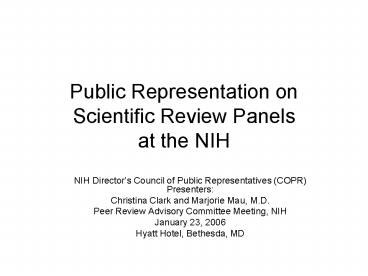Public Representation on Scientific Review Panels at the NIH - PowerPoint PPT Presentation
1 / 10
Title:
Public Representation on Scientific Review Panels at the NIH
Description:
NIH Director's Council of Public Representatives (COPR) Presenters: ... Comment on the science per se, unless otherwise qualified or requested ... – PowerPoint PPT presentation
Number of Views:44
Avg rating:3.0/5.0
Title: Public Representation on Scientific Review Panels at the NIH
1
Public Representation on Scientific Review Panels
at the NIH
- NIH Directors Council of Public Representatives
(COPR) Presenters - Christina Clark and Marjorie Mau, M.D.
- Peer Review Advisory Committee Meeting, NIH
- January 23, 2006
- Hyatt Hotel, Bethesda, MD
2
Background
- Scientific Peer Review process at the NIH
- gold standard in the field
- Recognize the challenges in this process
- to recruit and train the best reviewers
- to effectively evaluate a broad range of clinical
research - to increase transparency, accountability and
uniformity in the system - Current changes in process CSR leadership
challenge for suggestions and ideas - Study participant expert perspective offered as
an innovative adjustment intended to address a
missing element in the process
3
Establish Baseline Understandings
- Issue of Terminology
- Public member/ study participant expert.
- Its the intent of the concept we are focused on
today. - Study Participant Experts (SPEs)
- Intent is to have carefully defined and
structured involvement. - Purpose is to enhance reviews and achieve
scientific goals. - Goal today is to initiate a dialogue and find a
mechanism to continue todays discussions in a
future venue.
4
VALUE ADDED The Rationale for Including SPEs in
Peer Review
- Perspective of the target population missing in
the review of clinical research applications - Clinicians often removed from the people who are
the target population - Scientific reviewers trained to focus on the big
pictureasking, how will this advance science? - Scientific reviewers trained to focus on
technical issues and details - SPEs provide a bridge between the clinicians and
the study participants in the review process - SPEs focus on issues that make the research
feasible in the real world
5
What is the VALUE ADDED?
- Study Participant Experts provide important
perspectives on - Study design issues that affect recruitment
and/or retention of subjects - Human subject protections provisions
- Plans for involvement of women, minorities and
children - Issues related to the effectiveness of the
community outreach plan, if applicable - Community- or service-based issues/plans
- Other issues that are important to the target
populations
6
Who are Study Participant Experts?
- Represent the perspective of study participants
who need to be recruited and retained - Experience and skills
- to fill that role
- Screened/selected
- Trained in peer review
- Also Confidentiality,
- Conflict of Interest
7
Study Participant Experts do NOT
- Advocate for or against any topic, type, or scope
of research - Represent their advocacy organization or their
personal causes/stories - Discuss the potential funding of the application
or related research - Comment on the science per se, unless otherwise
qualified or requested - Treat participation in peer review like any other
advocacy or public role
8
When is it appropriate to include Study
Participant Experts?
- Applications which include human subjects
(clinical, population, community, service, etc.) - Scientific Review Administrator (SRA) decides to
include this expertise in assembling the panel - SRA selects the specific individual Study
Participant Expert (s) - NCI-CARRA program provides lists of screened,
trained and selected SPEs to SRAs to choose from
9
Synergy for Enhancing the Peer Review Process
- Answering Dr. Scarpas challenge for good ideas
and suggestions - Enhance the system to identify and conduct the
best science - Ensure appropriate participant recruitment
retention to protect and maximize resources
10
Continuing the Dialogue
- April 20 21, 2006 COPR Meeting
- NIH Public Trust Initiative
- NIH Roadmap, including CTSAs
- Office of Portfolio Analysis and Strategic
Initiatives - Trans-NIH Dialogue on Public Members in Peer
Review - Possible pilot program?
- Basis for inclusion decisions?































